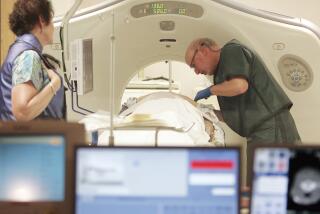Healthcare ruling may reduce uncertainty, add new uncertainty
- Share via
Uncertainty has been the buzz word in the struggling economy, as business leaders say they don’t want to hire until a few national policy decisions are resolved -- President Obama’s Affordable Care Act being one of them. So does that mean Thursday’s expected Supreme Court ruling on the healthcare law could boost hiring, and possibly Obama’s reelection chances, by removing that uncertainty?
Economists are not certain.
“The idea that having a clearer outlook on policy at all levels will produce certainty -- that’s true,” said Gregory Daco, an economist with IHS Global Insight. “But there remains a lot of uncertainty.”
“Whether we’re going to see a big uptick from the ruling on confidence front, I’m uncertain,” he added.
Last summer, when Congress was battling over the debt ceiling, uncertainty hamstrung the economy. Job growth, which had been strong in the beginning of the year, flattened, and the unemployment rate ticked up to 9.1% from 8.9%. Job growth also has been mediocre the last few months, in part because businesses say they’re waiting to see what happens in the economy. The healthcare ruling will do away with some of that uncertainty, Daco said, but could also create more uncertainty if parts of the ruling are struck down.
“The question is whether all of the uncertainty will be removed after the ruling,” Daco said. “It’s not necessarily the case that things will be clear and perfect.”
Anything that reduces the costs of healthcare will help businesses, and the economy, said Greg Martin, president of an excavating firm in Ohio, though it is not likely any ruling by the court will reduce healthcare costs that already were exploding over the last several decades. Martin said he already pays up to $15,000 annually per employee on healthcare costs, which makes him think twice about hiring. His business suffered so much during the recession that he has fewer than 50 employees, making him exempt from many of the law’s provisions.
Small business confidence stagnated in May, according to the National Federation of Independent Businesses.
“The lack of progress is discouraging, producing no signs that economic activity will pick up this year at all,” said NFIB Chief Economist William Dunkelberg. “The calculus of spending decisions requires an estimate of future sales, tax rates, interest rates and credit availability, labor costs, healthcare costs, regulatory compliance costs, all of which are very uncertain. Most of this uncertainty is the result of what is happening — and not happening — in Washington. Investments in jobs or plant and equipment are not the priority while people are still bracing for the worst.”
A healthcare ruling only represents a small part of these factors. That’s why it won’t likely have a short-term economic impact, said Craig Garthwaite, a professor at the Kellogg School of Management. It could have a long-term effect on the economy, he said, but that would be in a few years, too late to help or hurt Obama’s electoral chances. If the Supreme Court rejects the individual mandate but keeps in place regulations on insurance companies -- such as requiring coverage of those with preexisting medical conditions -- private companies could suffer, dragging down economic growth. If it lets healthcare exchanges be put into place by 2014, local economics could benefit, he said. But either way, its not going to significantly effect jobs.
“It’s certainly going to reduce a lot of uncertainty,” he said. “But I don’t know that the healthcare bill is the only thing causing a lot of people to be not hiring right now.”
If the law is upheld, Republicans will want to repeal it. If its thrown out, there will be uncertainty about what will replace it. And the upcoming election creates even more uncertainty, said Nigel Gault, another IHS economist.
“Regardless of the decision, there will be uncertainty,” he said. “Only the type of uncertainty will change.”
More to Read
Inside the business of entertainment
The Wide Shot brings you news, analysis and insights on everything from streaming wars to production — and what it all means for the future.
You may occasionally receive promotional content from the Los Angeles Times.











